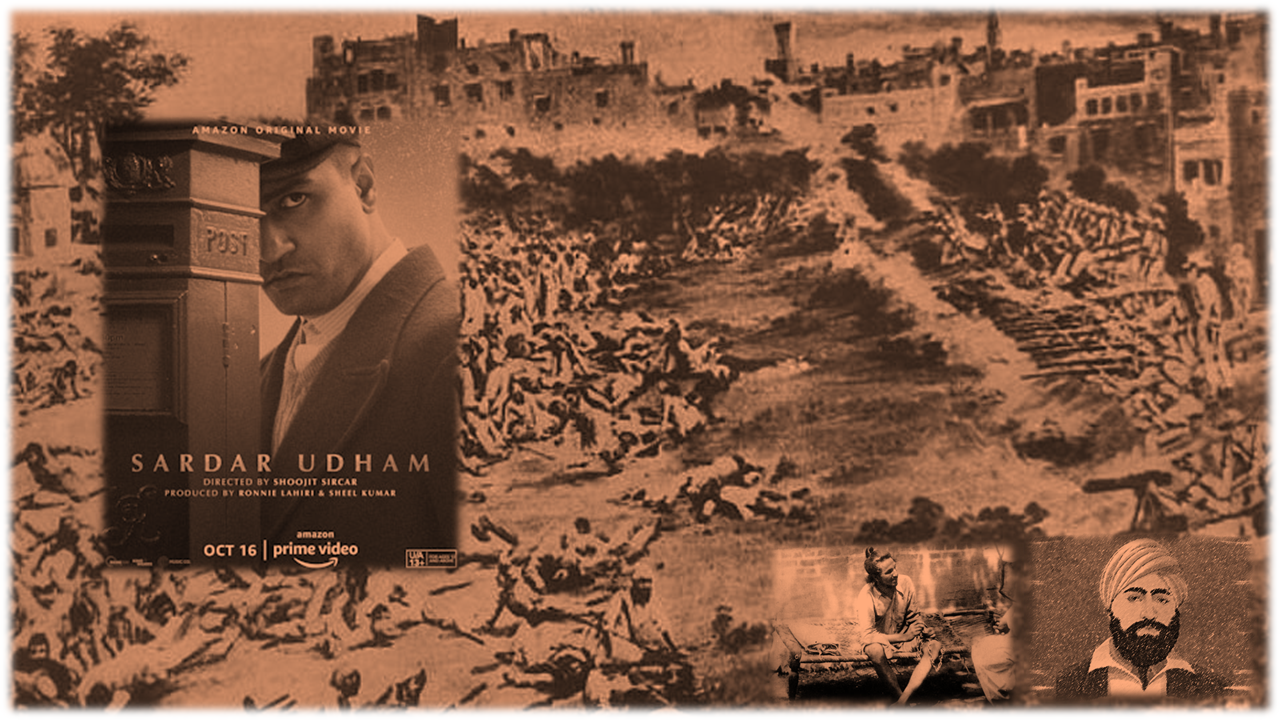Adnan Somra
When the demon goes out, within the angel’s light will come
The darkness of night is the close companion of dictators.
Hafiz , Diwan 159
No one has ever thought a romance filmmaker can produce such a blockbuster biopic on an Indian revolutionary figure. Shoojit Sircar is known for his movies such as October and Piku. Sardar Udham may be a flawed work as asserted by The Guardian (a western film review and news agency) but it’s flawed because it carries a political subject under its major themes. The film revolves around the revolutionary struggle of Sardar Udham aka Ram Muhammad Singh Azad (a symbolic name to embody the Indian religious unity). The film is highly criticised by the west yet it’s a tour de force. It tells the story of a young revolutionary but in its parallel, it is the story of the Jallianwala Bagh massacre. Both the massacre of Jallianwala Bagh and Sardar Udham have been reduced to mere footnotes in history books but the film offers a detailed synopsis of the subject.
“When I came to Mumbai almost twenty years ago in 2000, I wanted to make a film about Sardar Udham,” says Shoojit Sircar in an interview, “everyone knows Bhagat Singh but nobody talks about Sardar Udham who took care of what Bhagat Singh started. Shoojit Sircar’s unexpected shift from making a movie such as October to a biopic that adopts the subject of colonial terrorism and crimes of the British Empire committed against the Indian political awakening is a major setback for the film. As remarked by Phuang Le, a guardian reviewer, Shoojit’s meandering awareness is missing because he never tried his hands on the subject. But Shoojit Sircar himself proclaims that he has worked for over 21 years and studied a lot on the subject to reach the point of making this film.
Vicky Kaushal’s performance has been incredibly extraordinary throughout the film. One requires a lot of understanding about a character to get into it completely. I think that Kaushal’s experience of Sardar Udham is an absolute one. Most of the well-knitted and emotionally alluring acts are delivered by Kaushal. And as we have believed Amjad Khan was born to adopt the character of Gabbar Singh and make it eternal, we must believe in Kaushal as the redeemer of Sardar Udham. Kaushal’s performance is natural and profound.
The first two hours of the film tell about the life of Sardar Udham. It is a journey from one continent to another. From one mortal experience to another. From one revolution to another. It’s the story of Heer Ranjha (an Indian folktale of love). It is the story of common people. It’s the story of workers and liberators. It’s the tale of the oppressor and the oppressed. In the first two takes, Shoojit intended to make the audiences aware of the awakening of political consciousness in common people. In the third and final take, Shoojit depicts vividly the crimes of British imperialism. The last 40 minutes touch deeply as viewers are brutally shown a world of no mercy. At times it becomes really hard to keep watching the ruthless imagery from the sight of the massacre. It gives a taste of Danish Siddiqui’s covid coverage photography.
“Jallianwala Bagh Massacre was done to assassinate and eradicate the political thought in British India,” says Gandhi Ji. But the history was altered and Britain’s occupier constructed other ways to keep its presence in the subcontinent. Jallianwala Bagh became a lost subject, a distant history perhaps. Abdullah Hussein’s novel Weary Generations/Udaas Naslein tells us about the dreadful event through the eyes of a vendor who was selling fish on the day of the massacre at Jallianwala Bagh. We don’t have a detailed description of the brutal events that take place at Amritsar. We lost twenty thousand souls and no one protected any history of the events? The question still haunts our generation. The film in this way gives us a documented direction to colonialist crimes. It is the revival of the lost history. Finally, our generation can experience something which belongs to them. There’s still a lot to be done, this film can be a guide to cultivating an atmosphere of digging up the whole truths about British imperialism and its crimes.
The film was banned from screening in the Oscar series. It’s claimed by the Indian Oscar committee that it shows hatred towards Britain. There may be authenticity in the statements to an extent, for the occupiers don’t know any opposition. They only know who is on their side and who is not. They only know how to demolish any thought that goes against them. And that’s what they did on 13th April of 1919. Yet it’s just a peaceful protest against the Rowlatt act after all.
Patta Patta Boota Boota Haal Hamara jaane hai
jaane na jaane Gul hi na jaane baagh to sara jaane hai
Mir Taqi Mir
The writer lives in Layyah and currently studying Linguistics and Literature at BZU. He is interested in philosophy, history and religion. He Tweets at @_amor_fatii.



